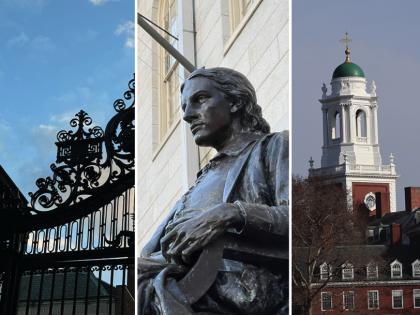The occupation of Massachusetts Hall last spring by the Progressive Student Labor Movement (PSLM)--proponents of a minimum "living wage" of $10.68 per hour for Harvard workers, a rate adopted by the city of Cambridge--ended with the formation of the Harvard Committee on Employment and Contracting Policies (see "Wage Wrangling," July-August 2001, page 64). This 20-member body was scheduled to deliver its report to President Lawrence H. Summers in December (after this issue went to press). Known as the "Katz Committee" after its chairman, professor of economics Lawrence F. Katz, the group included 11 faculty members, three unionized staff members, two administrators, and four students. In October, the committee held a public forum on its work-in-progress at the Kennedy School of Government, both to share interim findings and to hear viewpoints on the living-wage issue from the Harvard community. The event, attended by about 150 people, was "fairly unprecedented," according to Katz, in that a Harvard committee was releasing a major chunk of its data with deliberations still in progress.
The day of the forum began with a bombshell: a committee member, professor of economics Caroline M. Hoxby, abruptly resigned, claiming that the group was strongly biased toward the Living Wage Campaign position. Hoxby published her views in the Crimson. "I am ashamed to admit that my university does not have an atmosphere that fosters a free exchange of ideas on this topic," she wrote. "Anyone who speaks publicly against the Living Wage risks being demonized." In particular Hoxby charged that the committee's membership was "far from balanced," and that its data-collection process was slanted. "Just consider the testimony it [the committee] has heard," she wrote. "Apart from hearing from administrators and contractors who have presented institutional information, it has heard exclusively from groups lobbying for the living wage....The committee has not heard one presenter who made a positive case against the living wage."
At the forum, Katz countered that, on the contrary, the group had "heard from a wide range of speakers," and repeated several times during the evening that the committee was "open to all points of view." Program organizers had scheduled 10 speakers, eight of them Living Wage proponents, although two of these, a custodian and a security guard (the only persons on the agenda from job categories directly touched by the proposed reform), failed to appear, in one case because of a work-shift conflict.
The committee released some data it had collected, such as:
* As of March, Harvard directly employed 424 workers earning less than $10.68 per hour, up from 170 employees earning the equivalent amount (adjusted for inflation) in 1994. Of this group, 290 were custodians, 58 worked in dining services, 53 were security/museum guards, and 23 occupied various clerical/technical positions. All were union-represented.
* Contractors providing similar kinds of service or landscaping employed 579 workers at Harvard at rates below $10.68. Almost all these custodians and most dining-service workers were unionized, but the security/parking and landscaping personnel were nonunion.
* Between 1980 and 1996, Harvard outsourced much of its janitorial work. The number of in-house custodians consequently fell from 980 to 260. In 1996, a new contract pegged in-house custod-ians' wages to the local master union agreement, freezing salaries of existing workers and lowering pay for new workers. As a result, median hourly pay, adjusted for inflation, fell by 13 percent between 1994 and 2001. Simultaneously, the number of Hispanics, immigrants, and workers lacking a high-school diploma rose sharply among Harvard custodians.
The outsourcing of lower-paid work was a major area of contention. Associate vice president for facilities and environmental services Thomas E. Vautin argued for the merits of competition in the labor market, and for ensuring that "policies are applied uniformly to internal and external service providers." Vautin noted that by the late 1980s, cleaning buildings with Harvard's staff custodians "was costing 40 percent more than for an outside cleaning company--we could get cleaner buildings for less." In sharp contrast, Molly McOwen '02 of the Harvard Living Wage Campaign proposed a "ban on outsourcing in the service sector. Bring all service work in-house."
The stressful lives of those at the lower end of the wage spectrum formed another theme. "The wages Harvard employees earn translate not into buying store-brand foods, but to eating in soup kitchens," McOwen asserted. An undergraduate speaking from the floor told of a Harvard janitor who worked three jobs and hence got only "one and a half hours of sleep each weeknight--and he's been doing this for a couple of years." Skyrocketing housing costs in the Boston area have also squeezed low-wage earners. "Statewide, housing prices rose by 233 percent over the last two decades," said McOwen, "and real wages fell 16 percent in the past eight years. It's been catastrophic." Ascherman professor of economics Richard B. Freeman noted the increasing economic inequality of the country in recent years, and declared, "I think the living wage is within any bounds of the market. It is a decision of what the University wants to do. I think this University is wealthy enough and important enough to be a leader for the United States."
Living-wage advocates stressed the moral aspect of the proposed reform. "It's a moral choice, not only an economic analysis," said Phillips Brooks House Association president Trevor Cox '01. "The business of a university is not to think like a business." Opponents, a clear minority at the forum, leaned more toward pragmatic arguments. But Tal Ben-Shachar '96, a Leverett House tutor and graduate student in organizational behavior, wrote a broadside distributed before the forum that assailed the Living Wage Campaign on ethical grounds as well. He described the PSLM's occupation of University Hall as a "violation of property rights and disregard of democratic process," and questioned, with Hoxby, whether the atmosphere at Harvard favored a free exchange of ideas on the topic. Later, Ben-Shachar also raised this point from the floor. "The almost unified voice I have heard here tonight," he said, "does not alleviate my concern."








